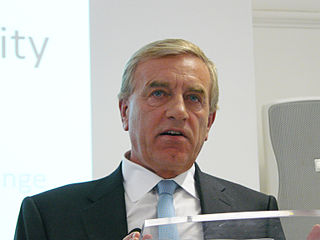The Ford Foundation is an American private foundation with the stated goal of advancing human welfare. Created in 1936 by Edsel Ford and his father Henry Ford, it was originally funded by a US$25,000 gift from Edsel Ford. By 1947, after the death of the two founders, the foundation owned 90% of the non-voting shares of the Ford Motor Company. Between 1955 and 1974, the foundation sold its Ford Motor Company holdings and now plays no role in the automobile company.

The Bill & Melinda Gates Foundation (BMGF), a merging of the William H. Gates Foundation and the Gates Learning Foundation, is an American private foundation founded by Bill Gates and Melinda French Gates. Based in Seattle, Washington, it was launched in 2000 and is reported as of 2020 to be the second largest charitable foundation in the world, holding $69 billion in assets. On his 43rd birthday, Bill Gates gave the foundation $1 billion. The primary stated goals of the foundation are to enhance healthcare and reduce extreme poverty across the world, and to expand educational opportunities and access to information technology in the U.S. Key individuals of the foundation include Bill Gates, Melinda French Gates, Warren Buffett, chief executive officer Mark Suzman, and Michael Larson.

A charitable organization or charity is an organization whose primary objectives are philanthropy and social well-being.

A financial endowment is a legal structure for managing, and in many cases indefinitely perpetuating, a pool of financial, real estate, or other investments for a specific purpose according to the will of its founders and donors. Endowments are often structured so that the inflation-adjusted principal or "corpus" value is kept intact, while a portion of the fund can be spent each year, utilizing a prudent spending policy.

The Carnegie Corporation of New York is a philanthropic fund established by Andrew Carnegie in 1911 to support education programs across the United States, and later the world.

A grant is a fund given by a person or organisation, often a public body, charitable foundation, a specialised grant-making institution, or in some cases a business with a corporate social responsibility mission, to an individual or another entity, usually, a non-profit organisation, sometimes a business or a local government body, for a specific purpose linked to public benefit. Unlike loans, grants are not intended to be paid back. Examples include student grants, research grants, the Sovereign Grant paid by the UK Treasury to the monarch, and some European Regional Development Fund payments in the European Union.
Lilly Endowment Inc., headquartered in Indianapolis, Indiana, is one of the world's largest private philanthropic foundations and among the largest endowments in the United States. It was founded in 1937 by Josiah K. Lilly Sr. and his sons, Eli Jr. and Josiah Jr. (Joe), with an initial gift of Eli Lilly and Company stock valued at $280,000 USD. As of 2020, its total assets were worth $21 billion.
TheUniversity of Law is a for-profit private university in the United Kingdom, providing law degrees, specialist legal training and continuing professional development courses for British barristers and solicitors; it is the United Kingdom's largest law school. It traces its origins to 1876.
The American Bar Foundation (ABF) is an independent, nonprofit national research institute established in 1952 and located in Chicago, United States. Its mission is to expand knowledge and advance justice by supporting innovative, interdisciplinary and rigorous empirical research on law, legal processes and legal institutions. This program of sociolegal research is conducted by an interdisciplinary staff of Research Faculty trained in such diverse fields as law, sociology, psychology, political science, philosophy, economics, history, and anthropology.
The Charles H. Revson Foundation was founded in 1956 by Charles H. Revson, the founding President of Revlon Cosmetics as a vehicle for his charitable giving. He willed half of his estate to the Foundation upon his death. Julie Sandorf has been the President of the Foundation since January 2008.
In the United States, a donor-advised fund is a charitable giving vehicle administered by a public charity created to manage charitable donations on behalf of organizations, families, or individuals. To participate in a donor-advised fund, a donating individual or organization opens an account in the fund and deposits cash, securities, or other financial instruments. They surrender ownership of anything they put in the fund, but retain advisory privileges over how their account is invested, and how it distributes money to charities.
The Esmée Fairbairn Foundation is a registered charity founded in England in 1961. It is one of the larger independent grant-making foundations based in the UK, funding organisations which aim to improve the quality of life for people and communities in that country.

The Sutton Trust is an educational charity in the United Kingdom which aims to improve social mobility and address educational disadvantage. The charity was set up by educational philanthropist, Sir Peter Lampl in 1997.
Until 1969, the term private foundation was not defined in the United States Internal Revenue Code. Since then, every U.S. charity that qualifies under Section 501(c)(3) of the Internal Revenue Service Code as tax-exempt is a "private foundation" unless it demonstrates to the IRS that it falls into another category such as public charity. Unlike nonprofit corporations classified as a public charity, private foundations in the United States are subject to a 1.39% excise tax or endowment tax on any net investment income.

Sir Peter Lampl, OBE, is a British philanthropist. He is the founder and chairman of the Sutton Trust and the Education Endowment Foundation.

Kappa Sigma (ΚΣ), commonly known as Kappa Sig or KSig, is an American collegiate social fraternity founded at the University of Virginia in 1869. Kappa Sigma is one of the five largest international fraternities with currently 318 active chapters and colonies in North America. Its endowment fund, founded in 1919, has donated more than $5 million to undergrads since 1948. In 2012 alone, the Fraternity's endowment fund raised over $1 million in donations.

The New York Foundation is a charitable foundation which gives grants to non-profit organizations supporting community organizing and advocacy in New York City.
Jon Lloyd Stryker is an American architect, philanthropist, and billionaire heir to the Stryker Corporation medical technology company fortune.

The Education Endowment Foundation (EEF) is a charity established in 2011 to improve the educational attainment of the poorest pupils in English schools. It aims to support teachers and senior leaders by providing evidence-based resources designed to improve practice and boost learning.

The David Bohnett Foundation is a private foundation that gives grants to organizations that focus on its core giving areas – primarily Los Angeles area programs and LGBT rights in the United States, as well as leadership initiatives and voter education, gun violence prevention, and animal language research. As of 2022, the foundation has donated $125 million to nonprofit organizations and initiatives.











